Introduction
Selecting the right marketing company is a pivotal decision for personal injury law firms aiming to enhance their visibility and client acquisition strategies. With the legal landscape becoming increasingly competitive, firms must navigate a complex array of marketing options while ensuring compliance with stringent advertising regulations. This article delves into the essential factors to consider when choosing a marketing partner, effective strategies that can amplify outreach, and the critical metrics that gauge success. By understanding the nuances of legal marketing and leveraging data-driven techniques, personal injury firms can position themselves for sustained growth and a stronger connection with potential clients.
Choosing the Right Marketing Company for Your Personal Injury Firm
When choosing personal injury marketing companies for your personal injury practice, it is vital to assess several important factors. Initially, the proficiency of personal injury marketing companies in legal promotion is crucial; their practices that focus on personal injury law have the refined comprehension necessary to maneuver through the intricacies of legal advertising regulations. Moreover, understanding local markets is essential, as promotional strategies must connect with the particular demographics of prospective customers.
A proven track record of success, particularly in cases similar to yours, can provide confidence in the capabilities of personal injury marketing companies. Interestingly, a case study titled ‘Lead Generation Practices in Legal Practices’ reveals that:
- 49% of legal entities consider acquiring web leads their best promotional channel.
- 86% do not gather email addresses, highlighting a significant gap in lead management.
- 35% of potential leads’ calls often go unanswered, underscoring the necessity for timely communication.
- 67% of individuals prefer legal practices that respond quickly.
- 70.7% of lawyers reply to leads within an hour.
Prioritizing agencies that emphasize prompt client engagement is crucial.
Additionally, only 8% of law firms invest in creating video content for promotional purposes, indicating a need for diverse strategies. A collaborative relationship with personal injury marketing companies can significantly enhance the effectiveness of your strategies. Ensure that the agency employs data-driven techniques to measure performance and continually optimize campaigns, which is essential for maximizing your return on investment.
Drawing on my experience collaborating with customers in Cleveland, Columbus, Pittsburgh, and Indianapolis, I stress that remaining aware of the latest strategies and successful alliances is essential for attaining ongoing success in the evolving legal promotion landscape.
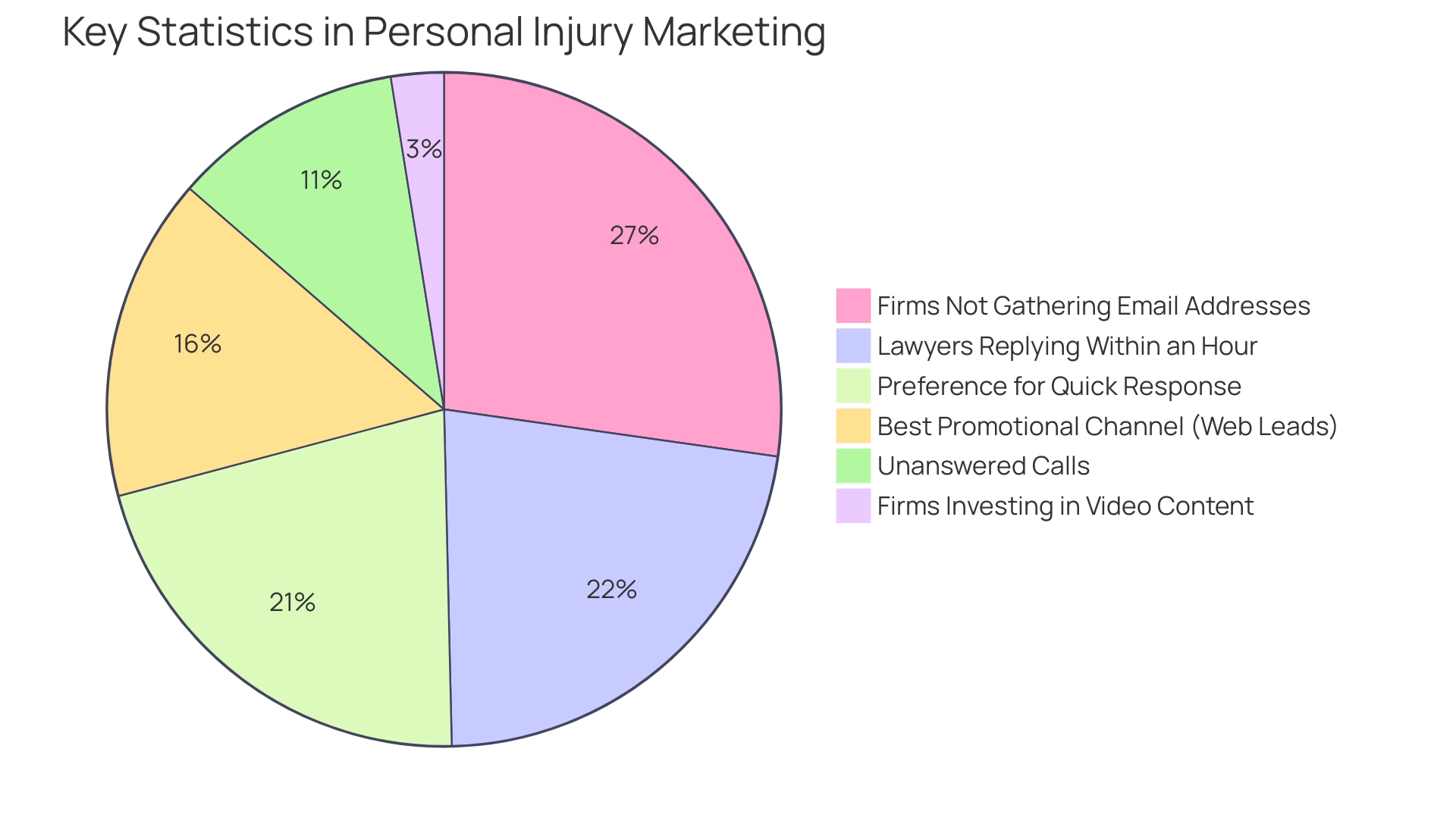
Effective Marketing Strategies for Personal Injury Law Firms
Personal injury marketing companies can significantly improve their customer acquisition efforts by employing a range of effective marketing strategies, including:
- Search Engine Optimization (SEO)
- Pay-Per-Click (PPC) advertising
- Content marketing
SEO plays a crucial role in enhancing organic search visibility, allowing businesses to connect with potential clients actively seeking legal assistance. A recent initiative demonstrated the potential of expanding a law practice’s online influence and local SEO strategy beyond Raleigh to other key cities, underscoring the importance of a wider reach in today’s competitive landscape.
This initiative emphasizes the necessity for legal practices to adjust their strategies to cover broader geographic areas to attract more clients.
Meanwhile, PPC campaigns provide immediate visibility and can effectively drive targeted traffic to a legal practice’s website, making them an excellent complement to SEO initiatives. Content promotion, through blogs and informative articles, not only establishes authority and trust within the community but also educates potential clients about their rights and options, contributing to more informed decision-making. Moreover, utilizing social media platforms boosts engagement and extends reach, generating chances for direct interaction with prospective clients.
Importantly, a survey by Justia indicated that 64.7% of legal practices believe their website produces the highest return on investment relative to other promotional efforts, highlighting the importance of a strong online presence. However, it is troubling that only 46% of participants in a recent ABA survey reported having a promotional budget, and 13% indicated that no one at their organization is accountable for promotion. Additionally, SEO agencies charge an average of $134.66 per hour, which highlights the financial consideration legal practices must account for when implementing these strategies.
Moreover, a case study titled ‘Does SEO work for legal practices?’ illustrates that successful execution of SEO strategies can lead to significant increases in online visibility and organic traffic, further validating the importance of these promotional efforts. To enhance effectiveness, personal injury marketing companies should incorporate these varied promotional elements into a unified strategy, ensuring that their customer acquisition efforts are comprehensive and in line with current industry standards for 2024.
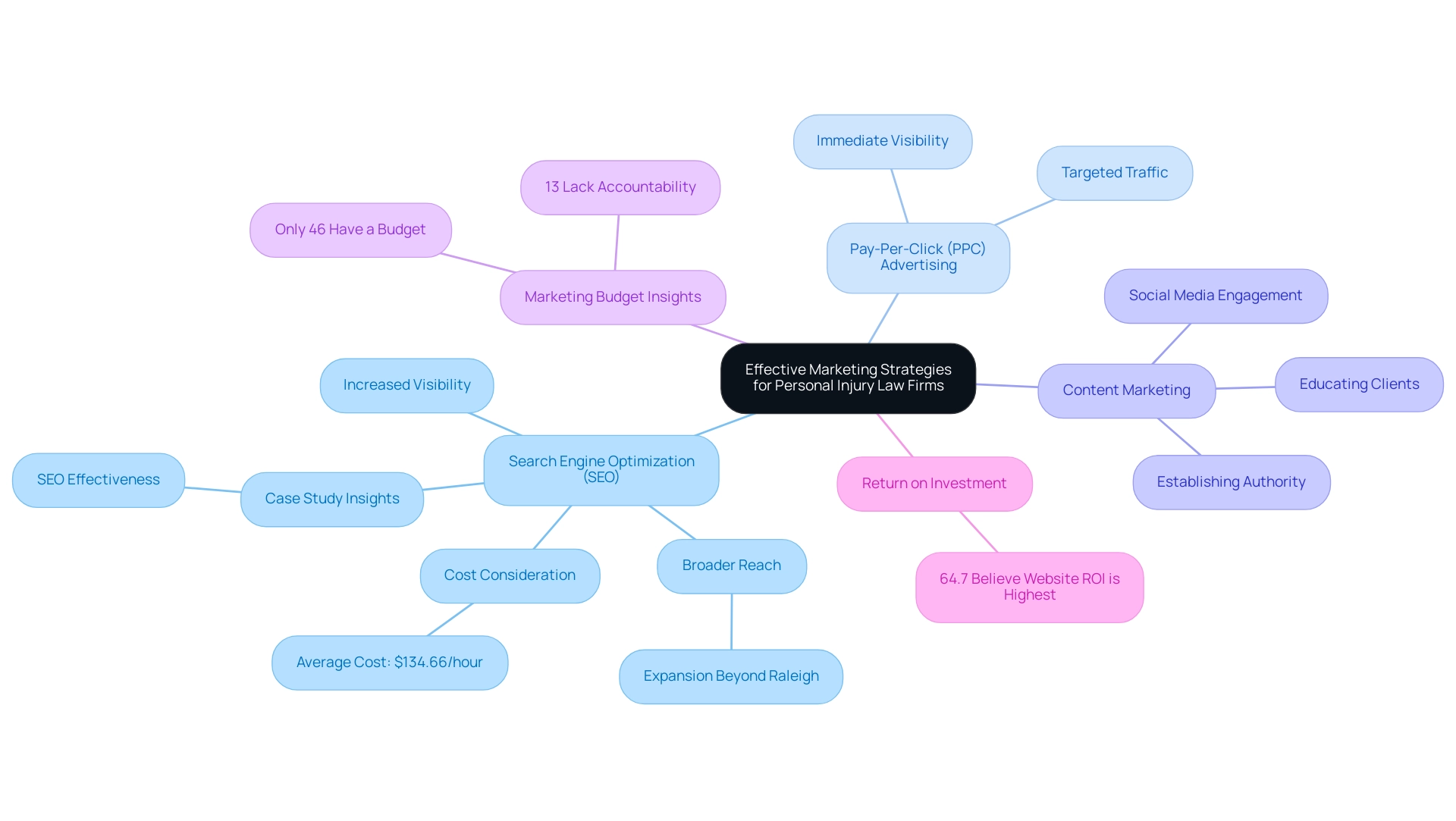
Measuring Success: Key Performance Indicators (KPIs)
To accurately assess the success of marketing campaigns, personal injury marketing companies should concentrate on several pivotal key performance indicators (KPIs). These KPIs encompass:
- Website traffic
- Conversion rates
- Cost per lead
- Customer acquisition costs
Monitoring website traffic yields valuable insights into the effectiveness of search engine optimization (SEO) and pay-per-click (PPC) initiatives.
Conversion rates, conversely, indicate how efficiently a website turns visitors into potential customers. It is also critical for companies to regularly test different site elements, such as:
- Headlines
- Images
- Layout
As these adjustments can lead to significant improvements in conversion rates. Assessing cost per lead is vital for measuring the financial efficiency of promotional strategies, while comprehending client acquisition expenses—which should ideally not surpass 33% of the total lifetime value anticipated from a new client—provides a thorough view of the overall effectiveness of investment efforts.
Additionally, tracking social media KPIs, such as engagement rates and follower growth, allows personal injury marketing companies to measure their online presence and make necessary adjustments to their strategies. As Raegan Fink, Marketing Manager at PMP, highlights, ‘Grasping these metrics is essential for any legal practice aiming to improve their promotional strategies.’ By routinely analyzing these metrics, legal practices can fine-tune their strategies to maximize performance and return on investment (ROI).
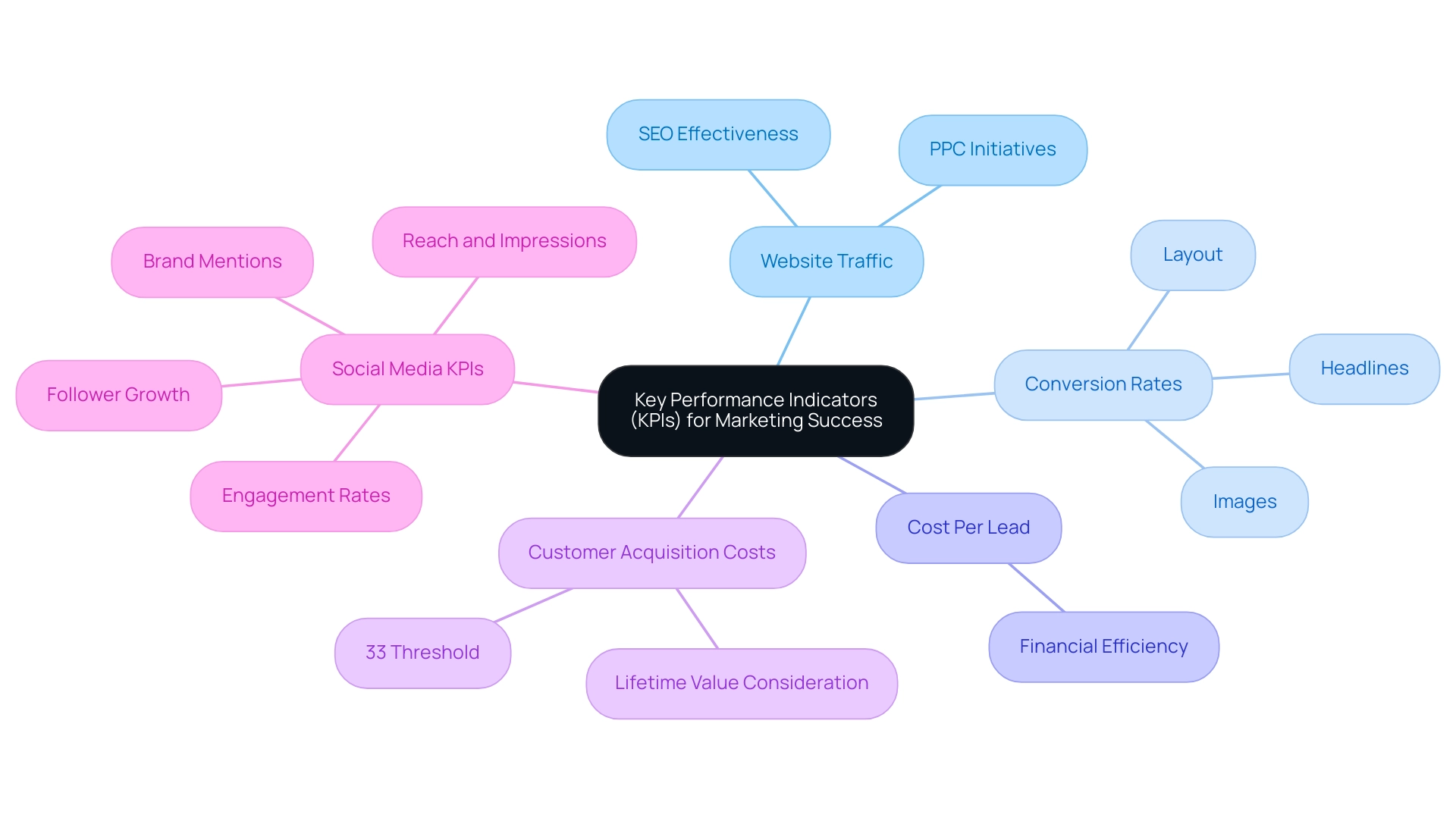
The Role of Content Marketing in Personal Injury Law
Content marketing plays a pivotal role for personal injury marketing companies seeking to connect with potential clients and establish their credibility within the legal landscape. By creating informative blog posts, articles, and videos that address common inquiries related to personal injury cases, these organizations can position themselves as authoritative figures in their field. Notably, while only 8% of legal practices currently invest in video content, those that do can leverage its engaging nature to differentiate themselves in a saturated market and gain a competitive edge.
Statistics show that the top three Google search results receive 75.1% of all clicks, highlighting the critical importance of SEO and content visibility. Law firms allocate an average of $150,000 on SEO, underscoring the necessity of maintaining business listings and using targeted keywords to improve search rankings. Incorporating testimonials and compelling case studies within marketing content further enhances trust and showcases successful outcomes, which is crucial for acquiring new customers.
Regularly refreshing content not only bolsters SEO efforts but also keeps audiences engaged, fostering loyalty and encouraging repeat visits for reliable information. This strategic approach aids personal injury marketing companies in attracting new clients through organic search traffic and is essential for cultivating a loyal client base necessary for long-term success.
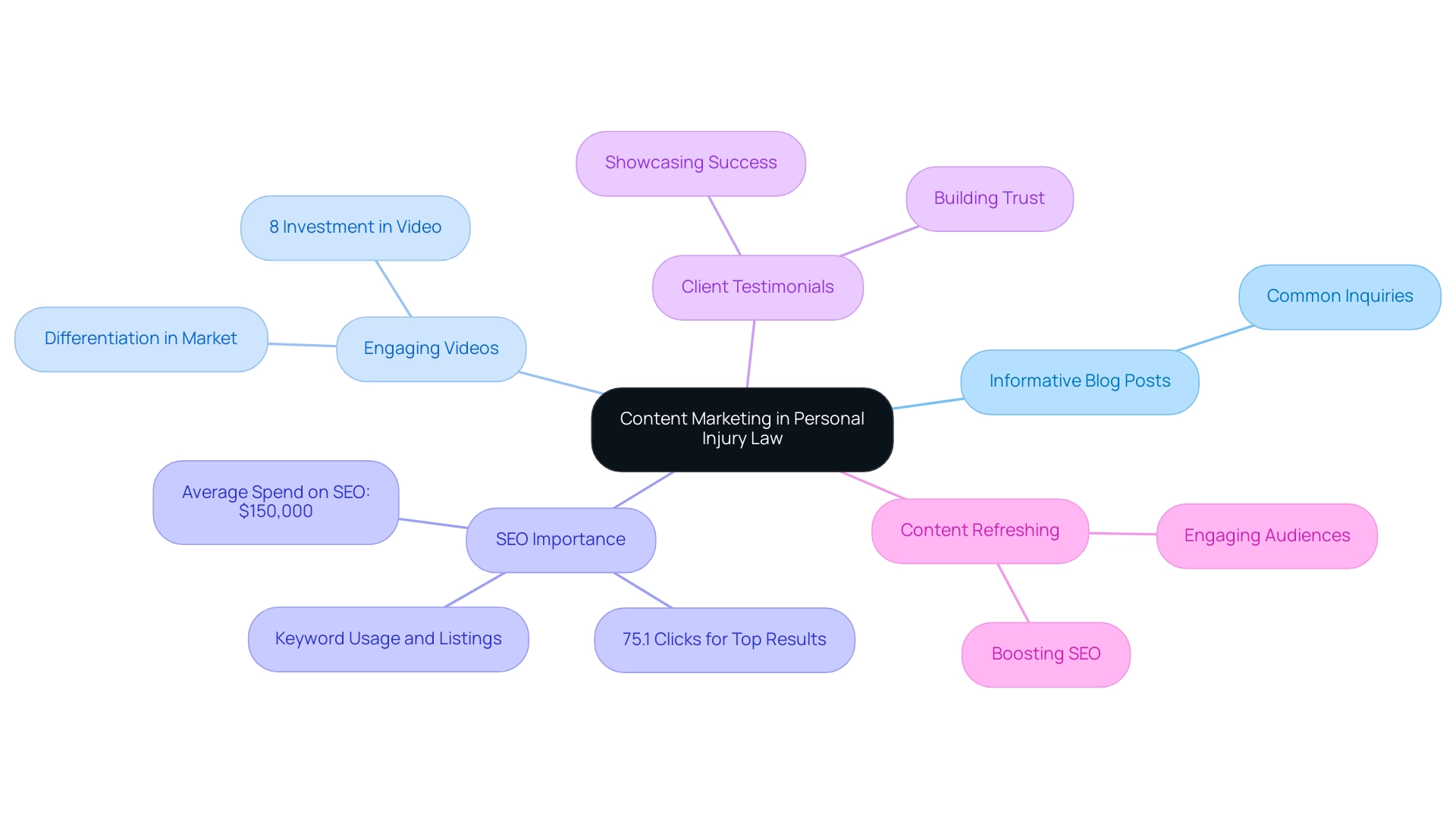
Navigating Legal Advertising Regulations
Navigating the intricate landscape of legal advertising regulations is paramount for personal injury practices aiming to effectively promote their services while ensuring compliance. Firms must familiarize themselves with state-specific rules governing attorney advertising, which often include stringent restrictions on testimonials, endorsements, and guarantees regarding case outcomes. The implications of non-compliance can be severe, both from a legal standpoint and in terms of reputational damage.
Moreover, ethical considerations surrounding misleading advertising practices necessitate a commitment to transparency and integrity in promotional efforts. For instance, the recent economic impact of regulations like the California Consumer Privacy Act (CCPA) underscores the importance of compliance; this legislation has introduced significant privacy restrictions, leading to an estimated 3.9% loss in California’s Gross Output (GOS), translating to approximately $46 billion in annual costs for the state. Overall, the total economic burden of the CCPA on the U.S. economy is estimated at $78 billion annually.
Additionally, it’s noteworthy that 37% of legal practices are investing in LinkedIn advertising, which highlights the growing trend of utilizing digital platforms for outreach. To navigate these complexities effectively, personal injury organizations may benefit from collaborating with personal injury marketing companies that specialize in legal marketing. Such partnerships can provide invaluable expertise in maintaining compliance with advertising regulations, thereby helping firms to cultivate a reputable brand that resonates with potential clients while adhering to ethical advertising practices.
As Gillian Diebold, Digital Media Specialist and Policy Analyst at ITIF’s Center for Data Innovation, emphasizes, understanding the landscape of legal advertising regulations is crucial for maintaining a competitive edge.
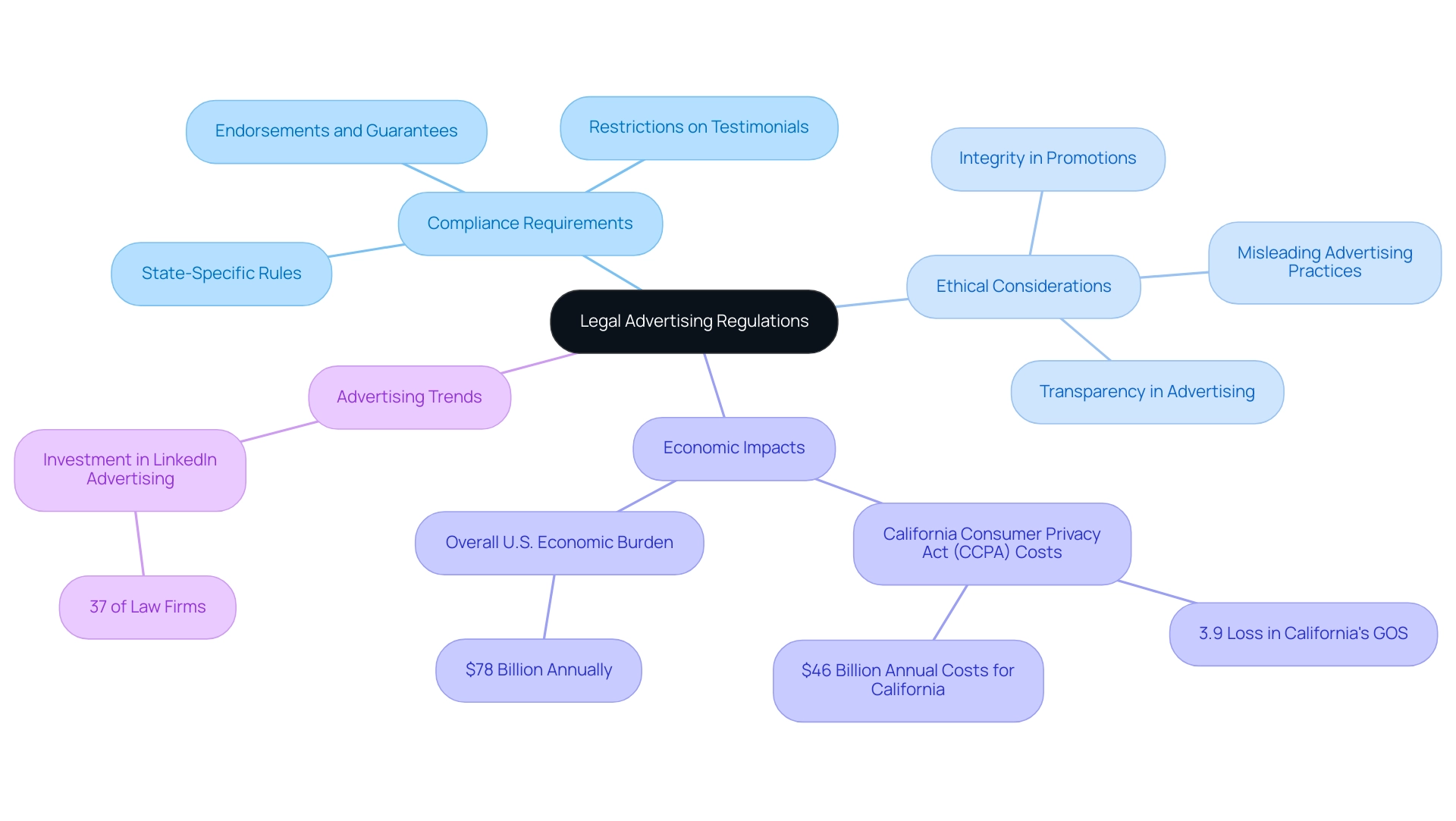
Conclusion
Choosing the right marketing company is essential for personal injury law firms aiming to enhance their visibility and client acquisition. The expertise of the marketing agency in legal marketing, particularly in personal injury law, is critical. Firms must prioritize agencies that understand local markets and have a proven track record of success. Effective communication and timely engagement with potential clients are also vital, as statistics show that prompt responses significantly influence client choices.
Implementing a diverse range of marketing strategies is equally important. SEO, PPC advertising, and content marketing are powerful tools that can significantly boost a firm’s online presence and client outreach. By integrating these strategies into a cohesive marketing plan, firms can maximize their effectiveness and adapt to the evolving competitive landscape. Additionally, leveraging social media and creating engaging content can further enhance client connections and brand authority.
Measuring success through key performance indicators allows law firms to evaluate the effectiveness of their marketing efforts. By tracking metrics such as website traffic, conversion rates, and client acquisition costs, firms can fine-tune their strategies and optimize their return on investment. Moreover, understanding and navigating legal advertising regulations is crucial to avoid potential pitfalls and maintain a reputable brand.
In conclusion, selecting a marketing partner equipped with the right expertise and strategies can position personal injury law firms for sustained growth. By focusing on effective marketing practices, compliance with advertising regulations, and continuous performance measurement, firms can build stronger connections with potential clients and thrive in a competitive landscape.

